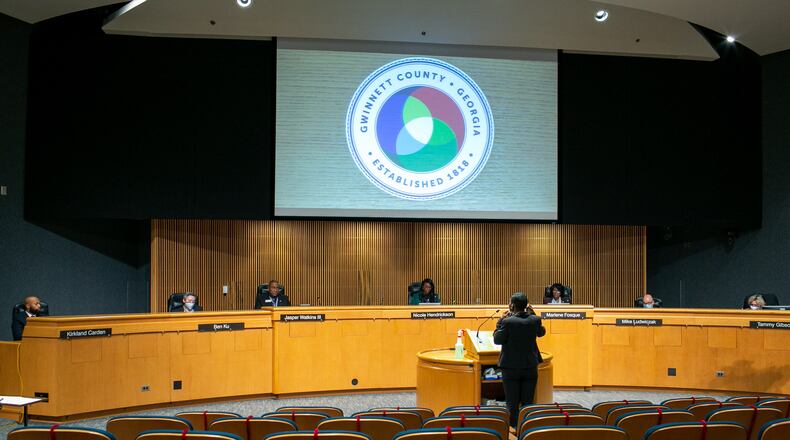Three Gwinnett County cities reportedly plan to pay the county tax commissioner to collect taxes and other fees for them, boosting her salary by more than $34,000.
The agreements come despite passage of a state law meant to end the practice of tax commissioners in Gwinnett and Fulton counties charging cities to collect their taxes, then pocketing the money.
Representatives from Berkeley Lake, Dacula and Peachtree Corners did not respond to requests for comment about the proposals, which county commissioners are expected to vote on Tuesday. But an internal email says the cities’ leaders intend to pay Gwinnett Tax Commissioner Tiffany Porter either $1 or $2 per parcel to collect taxes on the cities’ behalf.
Porter’s request for a $2-per-parcel fee to collect taxes in eight cities caused an outcry earlier this year. The Democrat, elected in the fall, makes $141,098. The addition of the fee, then allowed under state law, would have raised her salary by $110,734.
Several mayors and other city leaders said they would not pay, and state legislators hastily changed the law to prohibit Porter from charging to collect city taxes. The law also applies to Fulton County, where tax commissioner Arthur Ferdinand has engaged in the practice for years. But since the law can’t be applied retroactively to existing contracts, the fees Ferdinand charges to Fulton cities will remain in place.
The new law, signed by the governor May 10, does not refer to solid waste, storm water or streetlight fees, which are also collected through tax bills. In an email that city leaders described as combative and litigious, Porter said she wouldn’t collect those charges for the cities unless she was paid to do so.
“It’s wrong,” said Sugar Hill Mayor Steve Edwards. “I don’t like to be bullied.”
In the email, which was read to a reporter, Porter said the new law addressed tax collection, but not the collection of fees. She said any agreement to collect taxes would also have to include a per-parcel rate for those fees as determined by the tax commissioner.
Porter also said any agreements she made with cities had to include a provision saying that she did not agree to the constitutionality of the new law, and did not waive her right to contest it.
In an emailed statement, Porter said she was not negotiating with any cities. The cities, she said, were negotiating with the county for tax collection services.
Rep. Chuck Efstration, R-Dacula, was a sponsor of the legislation. He said it sent a “clear, bipartisan message” that tax commissioners shouldn’t raise taxes to increase their own salaries. Efstration said he wasn’t aware of Porter’s new attempts to raise her salary.
“The continued effort by the tax commissioner is unfortunate,” he said. “The intent of the General Assembly was very clear.”
Several cities, including Sugar Hill, have decided to collect taxes on their own, rather than pay Porter additional fees. The city of Grayson intends to try and force Porter to collect taxes under the terms of the new law — without any money going to her bottom line.
“This is her job,” Grayson Mayor Allison Wilkerson said. “I can’t in good conscience pay taxpayer funds for a stipend for the tax commissioner.”
Wilkerson said it cost Grayson 65 cents a parcel to bill property taxes until this year; Porter’s original proposal raised the rate to $3.80 a parcel. Wilkerson said because Grayson does not collect any other fees on its tax bills, she plans to pay the county $1.80 per parcel for taxes to be collected — Porter’s original proposal, minus the $2-per-parcel fee she also requested.
The internal county email describes the city’s approach as a “test case” for the new law.
It also says Porter is expected to make $27,532 from Peachtree Corners, $5,454 from Dacula and $1,308 from Berkeley Lake, which would would pay Porter $1 per parcel while the other two cities would pay $2 per parcel. Berkeley Lake’s agreement would not include the collection of non-property tax fees, though the other agreements would.
It will cost more initially for cities to bill taxes on their own, Edwards said, but working with the tax commissioner “could be a never-ending saga.”
“When you run for office and you know the salary, to get into office and want more is a fundamental problem,” Edwards said. “It’s a warning.”
County commissioners will still have to approve the cities’ agreements. Commissioner Kirkland Carden said he’s “very skeptical” about the extra work Porter will be doing to earn the additional salary.
Carden, whose mother ran against Porter in the Democratic primary and lost, has been outspoken about his concerns regarding the additional payments Porter requested.
“Justify that $2-per-parcel fee,” Carden said. “’The law says I can, therefore I will.’ That’s a losing argument for me.”
About the Author
Keep Reading
The Latest
Featured



